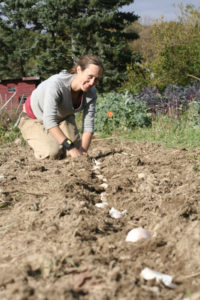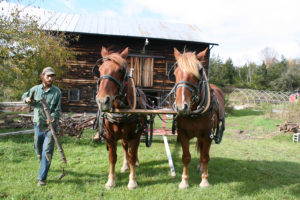New Farms Sprouted through Conservancy Lease Program
In 2010, the US imported 164.4 million pounds of “fresh garlic” and garlic imports continue to rise. However, in 2012 there will be a hundred or so people in the Hudson Valley who will be getting fresh local garlic from Great Song Farm in Milan, NY. This fall, Great Song is completing its first growing season and is planting a plot of garlic to be harvested next year.
The farmers at Great Song don’t own the land where they are planting their garlic and their other vegetables. They obtained the use of the property through Columbia Land Conservancy’s (CLC) Farmer Landowner Match Program. The program matches farmers seeking land with landowners who want their land farmed. CLC helps the farmer and landowner create a lease agreement that is mutually beneficial. Farmers may provide services, money, or crops in exchange for access to quality farmland. Everybody wins, including area residents who have increased access to local, healthy food.
Like many of today’s young farmers, the three farmers at Great Song didn’t grow up farming. Jen Carson was a social worker, Anthony Mecca studied computer science and literature, and Lisa Miskelly (who just joined the farming team at Great Song) didn’t work on a farm until after college. As beginning farmers, they each worked at a variety of farms around the US and Canada. Jen and Lisa overlapped at Hawthorne Valley Farm in Harlemville, NY before going on to work at separate farms.
After years of farming, both Jen and Anthony decided they wanted to run their own farm and partnered on a new venture. The cost of purchasing land, however, was a barrier to them. This is a problem for many young farmers.
“Many of the young people who work with me on my farm hope to run their own farms one day, and most see acquiring land as the biggest obstacle,” says Benjamin Shute, co-owner and manager of Hearty Roots Farm in Red Hook, NY and co-founder of the National Young Farmer’s Coalition. “That’s how I felt too, before I was able to rent some land from a farmer to get my vegetable operation started. Now we are trying to buy our own land, but it has been very challenging due to the very high land prices in the Hudson Valley.”
CLC developed the Farmer Landowner Match Program to help address the challenges farmers are facing regarding access to land. At the heart of the program is a database that contains profiles of farms that may be available for lease and profiles of farmers looking for land and their specific needs. When a possible match is identified, CLC staff work with the interested parties to help them establish productive and long-term relationships. CLC also runs workshops that help people learn how to navigate the farmer landowner arrangements, including leases, insurance, and the Agricultural Property Tax Assessments.
“CLC’s match program allowed us to connect with landowners around Columbia and Dutchess County,” says Jen. “Without CLC’s Farmer Landowner Match Program, we would most likely not have met Larry and Betti Steel, from whom we are leasing the 80 acres of vegetable field, pasture, and woodland.”
This past year, Great Song Farm had 80 members in its CSA, or Community Supported Agriculture, where members pre-purchase a share in the harvest and fill up a heaping basket of vegetables every week at the farm. Jen and Anthony particularly value the community aspect of providing food. Anthony remarked how pleasurable it was to hang out during the food pick-ups and chat with the members. He explains, “Farming allows the human being to connect deeply to the surrounding world, to form an intimate relationship with soil, plants, animals, and fellow human beings that is mutually supportive.”
Their approach to farming appeals to the landowners. “Like most successful marriages, the key ingredients are shared values and visions for the future,” remarks Larry Steel. “There has to be mutual respect for each other and for the land and property. My wife and I have found these things with Jen Carson and Anthony Mecca. In addition, their farming practices reflect their vision for a sustainable future.”
Great Song uses organic farming practices and reduces its carbon footprint and reliance on fossil fuels by employing animal power. Rather than using a tractor, they use Kate and Sunny – Suffolk Punch Draft Horses – who are responsible for most of the tilling and heavy lifting on the farm.
Jen recently started training their oxen to do some of this work as well. Jen guides Dick and Jane, the oxen, through training exercises where she teaches them to follow her body language and to refrain from grazing while they are working. They are generally very calm and obedient. However, Jen says that when they are pulling things that they get really into it and it’s a challenge to get them to slow down. They also show their personality with their active interactions with humans. Dick is vocal and often calls out when people walk by; and Jane is likely to lick anybody who gets within licking range, which is about 6 inches.
Great Song Farm plans to provide food for more people next year. In addition to their weekly pick-ups at their farm in Milan, they are teaming up with Lineage Farm – in Philmont, NY- to provide 30 to 60 member shares in Poughkeepsie, NY. Compared to Northern Dutchess and Columbia County, the Poughkeepsie area has more people and less farms, so it’s a natural fit that local farms will provide food to their neighbors to the south.
As the demand for local food continues to increase, there are 47 farmers in CLC’s database looking for land in the area. To date, Farmer Landowner Match Program has led to 18 successful new and expanded farm ventures.
“If you are a landowner, you should really consider leasing to a farmer,” says DeWayne Powell who leases 46 acres to Threshold Farms in Philmont. “Aside from the tax benefits, it’s a terrific sense of accomplishment that you are doing something to preserve good farmland.”
Landowners entering into a lease agreement with a farmer can lead to significant reductions in the expense of owning and maintaining land. The partnership with the farmer may include cash, crop sharing, and/or assistance with upkeep of their land. Many landowners with working farms are eligible for reduction in property taxes.
The Farmer Landowner Match Program is just part of a larger mission to ensure that farming remains a central part of the local economy and landscape. CLC holds conservation easements on 21,300 acres which permanently protects the natural characteristics of the land, including soil resources. Approximately 1/3 of this land is working farmland. CLC is currently working with Columbia County Agriculture and Farmland Protection Board to craft a plan to support and promote local agriculture.
For more information on CLC’s Working Farms program, contact Marissa Codey at 518.392.5252, ext. 211 or marissa@clctrust.org.



